大学英语presentation制作范例-介绍专业医生ppt课件
清新简洁英文医疗医生护士工作汇报总结PPT模板

1
YOUR TEXT GOES HERE
4
YOUR TEXT GOES HERE
It looks even better with you using this text. Whoever
It looks even better with you using this text. Whoever
evaluates your text cannot evaluate the way you write.
Simply dummy text of the printing and typesetting industry
YOUR TITLE HERE
HUMANS ARE CREATIVE BEINGS. IF IT IS NOT REAL TEXT, THEY WILL FOCUS ON THE DESIGN.
YOUR TEXT GOES HERE
Humans are creative beings. If it is not real text, they will focus on the design.
YOUR TEXT GOES HERE
Humans are creative beings. If it is not real text, they will focus on the design.
Simply dummy text of the printing and typesetting industry the printing and typesetting industry Simply dummy text of the printing and typesetting industry the printing
《专业医学英语演示课件》
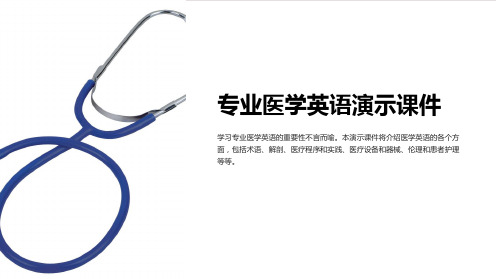
超声仪
探究如何使用超声仪检查疾病和 监控孕妇的胎儿。
常见医疗症状
1 呼吸系统
介绍流感、哮喘和肺炎等呼 吸系统常见疾病的症状。
2 循环系统
介绍高血压、心绞痛和心肌 梗死等循环系统常见疾病的 症状。
3 消化系统
介绍胃炎、胃溃疡和肝病等消化系统常见疾病的症状。
诊断测试和程序
1
血液学实验室
学习血液学实验室中的诊断程序,如血型和病理学检测。
专业医学英语演示课件
学习专业医学英语的重要性不言而喻。本演示课件将介绍医学英语的各个方 面,包括术语、解剖、医疗程序和实践、医疗设备和器械、伦理和患者护理 等等。
医学术语
1 常见词缀和前缀
2 诊断标准和定义
介绍各种词缀和前缀,如 "cardio-"、"neuro-"和"anti-"。
介绍常见病症的定义和判断 标准,如高血压和糖尿病。
探讨如何在临床实践中加强对患 者的关怀,并提高他们的生活质 量。
医德和职业道德
了解医德和职业道德的重要性, 并如何在工作中增强医德。
患者隐私保护
学习患者隐私保护的政策、原则 和措施。
医学研究和临床实践
临床试验
介绍临床试验的过程、类型和阶段,以及如何进行 数据分析。
病例研究
学习如何多角度透析一个病例,如病史、检查和治 疗过程等。
3 专业领域词汇
学习一些特定医疗领域的专Байду номын сангаас词汇和缩略语,如心脏科和神经学。
解剖和生理学
心脏解剖和功能
探究心脏的结构和功能,如心脏 值和传导组织。
呼吸系统
了解呼吸系统的结构和功能,如 肺泡和支气管。
医学专业英语课件_1761页PPT文档

HHale Waihona Puke story --- Key Dates
• His two sons began their medical training early, first by observing, and later by assisting their father on patient visit and with autopsies
History of Mayo clinic
• Mayo Clinic evolved gradually from the frontier practice of Dr. William W. Mayo and his two sons--- Dr. William J. Mayo and Charles H. Mayo.
History--- Key Dates
• 1920 --- Mayo develops a system for grading cancer numerically, which is adopted worldwide and still used today
• 1925 --- Dr. William H. Goeckerman reports on the use of tar and ultraviolet light to successfully treat psoriasis. This is a therapeutic breakthrough that remains a highly effective treatment for psoriasis
• 1889 --- Saint Marys Hospital opens with 27 beds
• 1892 --- First partner added to Mayo family practice. More physicians are involved to join, thus beginning the concept of medical teamwork.
医学英语课件讲课稿模板

一、课程简介尊敬的同学们,大家好!今天我们将一起学习医学英语课件。
医学英语作为一门专业英语,对于从事医学领域工作的人员来说至关重要。
通过本课程的学习,我们将掌握医学英语的基本词汇、语法和常用表达,为今后的学习和工作打下坚实的基础。
二、课程目标1. 熟悉医学英语的基本词汇和语法;2. 掌握医学英语的常用表达和句型;3. 培养医学英语阅读、写作和听力能力;4. 提高医学英语的实际应用能力。
三、课程内容1. 医学英语基本词汇(1)人体器官及部位heart 心脏brain 脑lung 肺kidney 肾stomach 胃liver 肝spleen 脾intestine 肠muscle 肌肉bone 骨(2)常见疾病及症状cancer 癌症diabetes 糖尿病heart disease 心脏病asthma 哮喘flu 流感cold 咳嗽headache 头痛fever 发烧nausea 恶心dizziness 头晕2. 医学英语语法(1)时态一般现在时:表示现在经常性或习惯性的动作或存在的状态;一般过去时:表示过去某个时间发生的动作或存在的状态;一般将来时:表示将来某个时间将要发生的动作或存在的状态;现在进行时:表示现在正在进行的动作;过去进行时:表示过去某个时间正在进行的动作;将来进行时:表示将来某个时间将要进行的动作。
(2)语态被动语态:表示主语是动作的承受者。
3. 医学英语常用表达(1)询问病情How are you feeling today?How is your condition?Can you describe your symptoms?Are you experiencing any pain?Do you have any allergies?(2)诊断疾病Based on your symptoms, I believe you have a cold. Your blood pressure is normal.Your heartbeat is irregular.Your blood sugar level is high.You have an infection in your lung.(3)治疗建议Please take this medicine three times a day.You need to rest more and drink plenty of water. You should have surgery to remove the tumor.It's important to follow the doctor's instructions.四、课堂练习1. 请同学们用所学词汇和语法完成以下句子:I ___________ (have) a headache this morning.She ___________ (be) a doctor.He ___________ (get) up at 6:00 a.m. every day. They ___________ (go) to the hospital last week. 2. 请同学们用所学表达回答以下问题:How are you feeling today?Can you describe your symptoms?What should I do if I have a fever?五、课后作业1. 请同学们查阅资料,了解以下疾病的英文表达:a. 心脏病b. 糖尿病c. 癫痫d. 癌症2. 请同学们用所学知识写一篇关于医学英语的短文,字数不少于300字。
医用英语整套课件完整版PPT教学教程最全电子讲义教案(最新)

English for Health Sciences
Grammar
Picture
Text
Resource
Dictionary
Unit Reviews
Medical
\English 250
| we did professional work
Unit
1
Making a diagnosis
part2ic. ipaMtoorsyt. students will disagree with this面.T,his表ty示pe疼of痛
When taqkuiensgtiaonmisedsiocmalehtimisetosrcya, lyleoduas”hleoaudlidng…question”beAcgaruesee itDisagree
1. atrsy3ydtoo.eputoaalprsesiSrlcsaskoooidbfmiaenfslescyet.seohmisnuoetatnurdpnaadoaytleintomoine’ntptnas.weOtymnrttiwo-thaeeaetynhnrtdhsseteeatmadomynaqhtshdyuew例HSaoseaettweasror.ta如nytmaitdokhtiaamhnia:nccastmghhttaeheyncoedohuithaeeetcseoalcyulto.头hl肚duclf痛d子aorrdeg痛isett或rac胃t 痛
Contents
Unit
Translation
b
Put these steps for taking a patient’s history into the correct pare your answers with those of a partner.
医疗行业-医学专业英语课件9 精品

process, I’m afraid. You will have to wait for twenty minutes. Complete recovery will take a rather long
with your work. You should be very careful for a week or two. Try to relax and keep calm.
Sentences Commonly Used by
Medical Personnel
You’ll soon be all right. I’m sure this medicine will help you a
Sentences Commonly Used by
Medical Personnel
1. It’s difficult to say just now exactly what’s wrong.
2. This is quite common among people of your age. / This often happens to people of your age. / This often occurs at your age.
(surgery,dermatology, urology) department.
Sentences Commonly Used by
Medical Personnel
1. Your WBC (RBC, hemoglobin, urine, stool, sputum) should be checked.
time.
学术英语(医学)Unit 1演示PPT
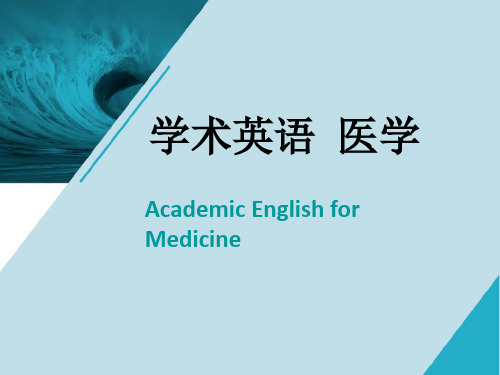
• Language building-up – Signpost language – Formal English – Vocabulary test
• Suggested answers
8
Unit 1 Doctors’ Life
Text A
Critical reading and thinking
Useful expressions
• a 56-year-old woman • somewhat overweight • reasonably well-controlled diabetes and hypertension • cholesterol on the high side without any medications for
Questions for discussion
• How do you interpret the title?
– neuron overload – juggling physician
9
Unit 1
Text A
Doctors’ Life
Critical reading and thinking
Topics for presentation
1 Do you agree that it is sheer neuron overload on the doctor side that leads to the complaint that doctors don’t listen?
• neuron overload • patients’ high expectations • mistrust and misunderstanding between the
英语演讲医学英语短文课件
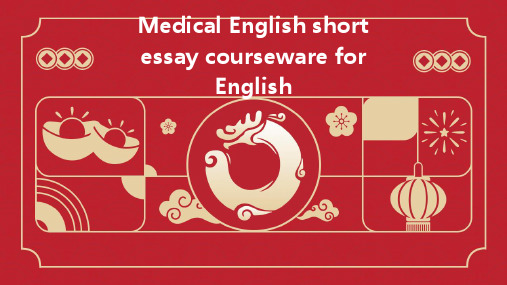
02
Semantic analysis
able to distinguish easily confused words in medical English,
such as "symbol" and "sign".
03
Abbreviations and acronyms
Familiar with commonly used abbreviations and acronyms in the
Thesis development
The ability to formulate and defend a clear and well supported central idea or claim through the speech
Evidence presentation
The ability to present evidence or examples that are relevant, relevant, and convincing to support the argument
Non verbal expression skills
Body language
The ability to use post, style, financial expressions, and eye contact to enhance the delivery of the speech and establish a connection with the audience
Detailed description
Design various forms of exercise questions, such as multiple-choice questions, fill in the blank questions, short answer questions, etc., to help students consolidate their knowledge through practical operations, improve reading comprehension and application abilities.
英文介绍医学ppt模板

VALUE
01
Stylish design
Stylish templates can be a valuable aid to creative professionals.
Stylish templates can be a valuable aid to creative professionals.
Stylish design
Stylish templates can be a valuable aid to creative professionals.
Stylish design
Stylish templates can be a valuable aid to creative professionals.
பைடு நூலகம்
Infographic elements
Slide sub title
Powerpoint ofqfers word processing, outlining, drawing, graphing, and presentation management tools- all designed to be easy to use and learn
More choices and visual trends
Lorem ipsum dolor sit amet, consectetur adipisicing elit, sed do eiusmod tempor incididunt ut labore et dolore magna aliqua. Ut enim ad minim veniam, quis nostrud exercitation ullamco laboris nisi ut aliquip ex ea commodo consequat. Duis aute irure dolor in reprehenderit in voluptate velit esse cillum dolore eu fugiat nulla pariatur.
presentation——专业英语课件PPT
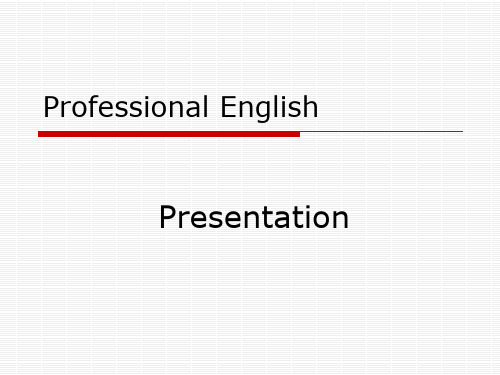
Not to use technical expressions or acronyms unfamiliar to the audience
Employ techniques like: summarization, restatement, enumeration...
Edit for the ear: round off numbers and statistics, avoid
Extemporaneous: prepared and delivered from an outline
3. Presentations usually complement some type of written communication.
4. Presentations usually employ some type of visual aid.
Occasions for selling
5
Typical presentations in the org.
Results of engineering evaluations Status report on affirmative action progron Systems demonstration for upper
Skilled and experienced speaker
Outline
Inexperienced and nervous speakers
Word for word
Suggestions
Use short sentences and avoid complex sentence construction
management Briefings for vendors Briefings for senior executives on community
医学英语课件讲课稿
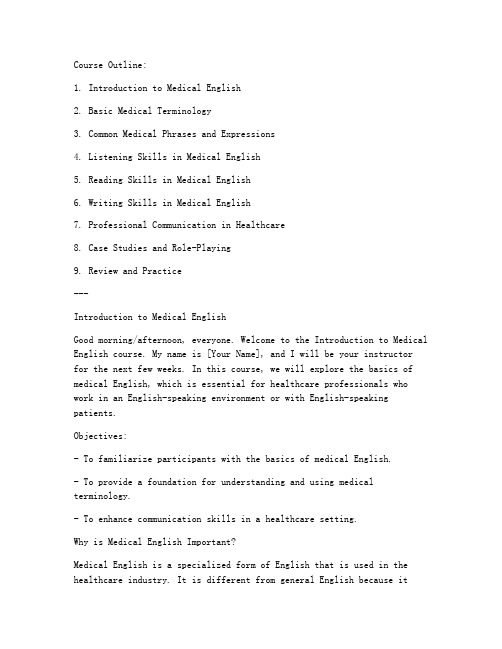
Course Outline:1. Introduction to Medical English2. Basic Medical Terminology3. Common Medical Phrases and Expressions4. Listening Skills in Medical English5. Reading Skills in Medical English6. Writing Skills in Medical English7. Professional Communication in Healthcare8. Case Studies and Role-Playing9. Review and Practice---Introduction to Medical EnglishGood morning/afternoon, everyone. Welcome to the Introduction to Medical English course. My name is [Your Name], and I will be your instructorfor the next few weeks. In this course, we will explore the basics of medical English, which is essential for healthcare professionals who work in an English-speaking environment or with English-speaking patients.Objectives:- To familiarize participants with the basics of medical English.- To provide a foundation for understanding and using medical terminology.- To enhance communication skills in a healthcare setting.Why is Medical English Important?Medical English is a specialized form of English that is used in the healthcare industry. It is different from general English because itcontains specific vocabulary, phrases, and grammar structures that are unique to the medical field. Being proficient in medical English can help healthcare professionals:- Communicate effectively with patients, colleagues, and other healthcare providers.- Understand medical literature and research articles.- Provide high-quality patient care.- Navigate the healthcare system more efficiently.---Basic Medical TerminologyVocabulary Building:In this section, we will introduce some of the most common prefixes, suffixes, and root words used in medical terminology. These components form the building blocks of medical words.- Prefixes: Prefixes are added to the beginning of a word to modify its meaning. For example, "un-" means "not" or "opposite," as in "unconscious" (not conscious).- Suffixes: Suffixes are added to the end of a word to change its function or meaning. For example, "-ation" means "process" or "action," as in "inflammation" (the process of inflammation).- Root Words: Root words are the core of a medical term and carry the primary meaning. For example, "patho-" means "disease," as in "pathology" (the study of diseases).Example Words:- Patho- (disease): pathology, pathogen- Dia- (through): diaphragm, diameter- Cardi- (heart): cardiogram, cardiovascular- Thromb- (clot): thrombosis, thrombusActivity:Now, let's practice some exercises to reinforce our understanding of medical terminology.1. Identify the prefix, suffix, and root word in the following terms:- Neurology- Ischemia- Osteoporosis- Endocarditis2. Create new medical terms using the following prefixes, suffixes, and root words:- Prefix: "peri-" (around)- Suffix: "-oplasty" (surgery)- Root Word: "myo-" (muscle)---Common Medical Phrases and ExpressionsIn this section, we will cover some common phrases and expressions that are frequently used in medical settings.1. Greeting and Introduction:- Good morning/afternoon, how are you?- My name is [Your Name], and I am the [Your Position] on this team.- May I have your name and date of birth, please?2. Taking a Medical History:- Can you tell me about your medical history?- Have you ever had any allergies?- Do you have any chronic conditions?3. Common Medical Instructions:- Please take two tablets with water three times a day.- It is important to follow your treatment plan.- Avoid contact with others if you have a fever.4. Describing Symptoms:- I have a headache and a sore throat.- I feel dizzy and have a high fever.- I am experiencing chest pain.Activity:Let's practice using these phrases and expressions in a role-play scenario. Pair up with a fellow student and take turns being the patient and the healthcare provider.---Listening Skills in Medical EnglishListening is a crucial skill for healthcare professionals, as it allows us to understand patients' concerns and follow medical instructions.Strategies for Effective Listening:- Pay attention to key words and phrases.- Listen for tone and emphasis.- Take notes if necessary.- Ask clarifying questions if you are unsure about something.Activity:We will listen to a short audio clip of a patient describing their symptoms. After listening, we will discuss the information provided and answer some comprehension questions.---Reading Skills in Medical EnglishReading skills are essential for healthcare professionals to stay updated with the latest medical research and guidelines.Strategies for Effective Reading:- Skim the text to get an overview of the content.- Focus on headings, subheadings, and key points.- Look for keywords and phrases related to the topic.- Use dictionaries or online resources to understand unfamiliar terms.Activity:We will read a short article on a medical topic and answer some comprehension questions to test our reading skills.---Writing Skills in Medical EnglishWriting is an important skill for healthcare professionals, as it is often necessary to document patient information, write reports, and communicate with colleagues.Basic Writing Skills:- Use clear and concise language.- Follow a logical structure.- Use proper grammar and punctuation.- Include all relevant information.Activity:We will write a short report based on the information provided in the previous reading activity. We will focus on organizing the information and using appropriate medical terminology.---Professional Communication in HealthcareEffective communication is the cornerstone of patient care. In this section, we will discuss the importance of professional communication and provide some tips for improving communication skills.Key Points:- Listen actively and empathetically.- Use open-ended questions to encourage patient expression.- Provide clear and understandable instructions.- Maintain confidentiality and respect patient privacy.Activity:We will engage in a group discussion about common communication challenges in healthcare and brainstorm strategies for overcoming them.---Case Studies and Role-PlayingIn this section, we will apply our knowledge and skills to real-life scenarios. We will work in small groups to analyze case studies and practice role-playing exercises.Case Study:A patient presents to the emergency department with severe chest pain. As the healthcare provider, you need to assess the patient, gather information, and provide appropriate care.Role-Playing:Pair up with a fellow student and take turns being the patient and the healthcare provider. Practice taking a medical history, describing symptoms, and providing instructions.---Review and PracticeIn the final session, we will review the key concepts covered in the course and provide additional practice opportunities.Review Points:- Basic medical terminology- Common medical phrases and expressions- Listening and reading skills- Writing skills- Professional communicationPractice Activities:- Vocabulary review exercises- Listening comprehension exercises- Reading comprehension exercises- Writing exercises- Group discussions and role-playing---ConclusionThank you for participating in the Introduction to Medical English course. I hope that you have found this course informative and beneficial. Remember that proficiency in medical English is an ongoingprocess, and continuous practice and learning are essential. Best of luck in your future healthcare endeavors!---Additional Resources:- Medical English dictionaries- Online medical journals and resources- Language learning apps and websites- Professional healthcare organizations offering English language courses---This讲课稿涵盖了医学英语课程的主要内容和活动,旨在帮助学员建立医学英语的基础,提高他们的沟通能力,并为他们未来的职业生涯做好准备。
医学生、医生专用ppt模板
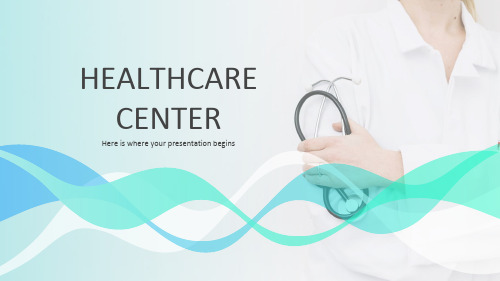
The Sun is the star at the center of the Solar
System
Venus has a beautiful name, but it’s terribly
hot
Jupiter is the biggest planet in our Solar System
20072012
20122015
2015-2019
Jupiter is the biggest planet in our Solar System
Despite being red, Mars is a cold place, not hot
OUR HEALTHCARE CENTER 10
OUR PROCESS
INTRODUCTION
It could be the part of the presentation where you can introduce your healthcare center. Keep it short and go straight to the point. Your audience will appreciate that
A BRIEF STORY
MILESTONES REACHED
The Sun is the star at the center of the Solar
System
Saturn is composed mostly of hydrogen and
helium
20032007
2001-2003
Venus has a beautiful name, but it’s terribly hot
- 1、下载文档前请自行甄别文档内容的完整性,平台不提供额外的编辑、内容补充、找答案等附加服务。
- 2、"仅部分预览"的文档,不可在线预览部分如存在完整性等问题,可反馈申请退款(可完整预览的文档不适用该条件!)。
- 3、如文档侵犯您的权益,请联系客服反馈,我们会尽快为您处理(人工客服工作时间:9:00-18:30)。
Definition:
Education and training of a doctor
• Needs 5 to 8 years to get a medical degree, and 1 to 2 years' supervision after graduation.
There are many different types of doctors
• paediatrician 儿科医生 [,piːdɪə'trɪʃ(ə)n] • gynecologist 妇科医生 [,ɡaɪnə'kɑlədʒɪst] • veterinarian 兽医 ['vɛtərə'nɛrɪən]
DifferenБайду номын сангаас position
• • • • • • nurse 护士 head nurse 护士长 houseman 实习医生 doctor in charge 主治医生 head of the nursing department 护理部主任 • head of out-patient department 门诊部主任 • head of the medical department 内科主任 • head of the surgical department 外科主任
Advantages of being a professional doctor • 1. Help patience to regain their health and is highly respected by people in the society.
2. Well-paid.
Disdvantages of being a professional doctor • 1. On call 24 hours. • 2. Under high pressure. • 3. Possible to get infected.
大学英语 presentationPP T制作范例-介绍专 业医生
• Doctor (Dr.) or physician is a professional who practices medicine, which is concerned with human health through the study, diagnosis, and treatment of diseases and injuries.
• Wish you all a healthy and energetic body!!
The End
Conclusion
• Like many other professionals, doctors have completed formal education and training, possess particular knowledge and skills, and have their advantages and disadvantages.
• physician 内科医生 • surgeon 外科医生 ['sə:dʒən] • • • • • • dentist 牙科医生 oculist 眼科医生 ['ɒkjʊlɪst] ENT doctor 耳鼻喉科医生 (ear,nose,and throat) brain specialist 脑科专家 heart specialist 心脏病专家 psychologist 心理医生
Quality needed
• Majoring in science. • Especially good at Biology. • Enough patience. • Careful obervation. • Good memory. • Medical ethics. • Devotion. • Not afraid of blood. • Mysterious handwriting.
